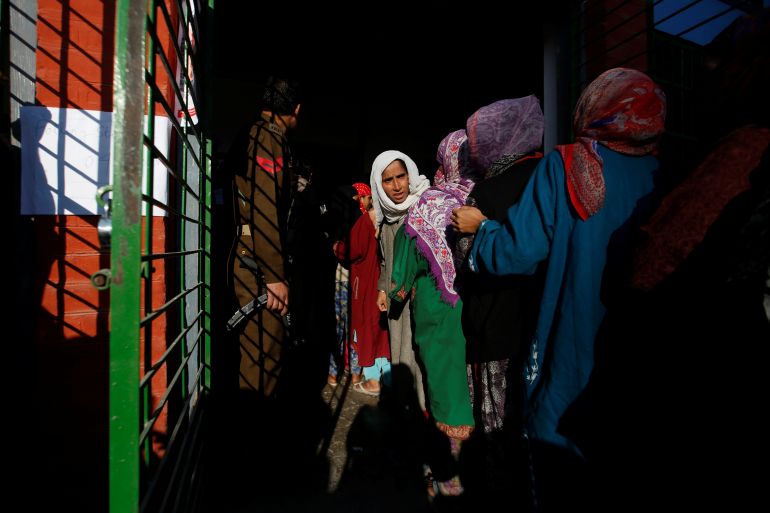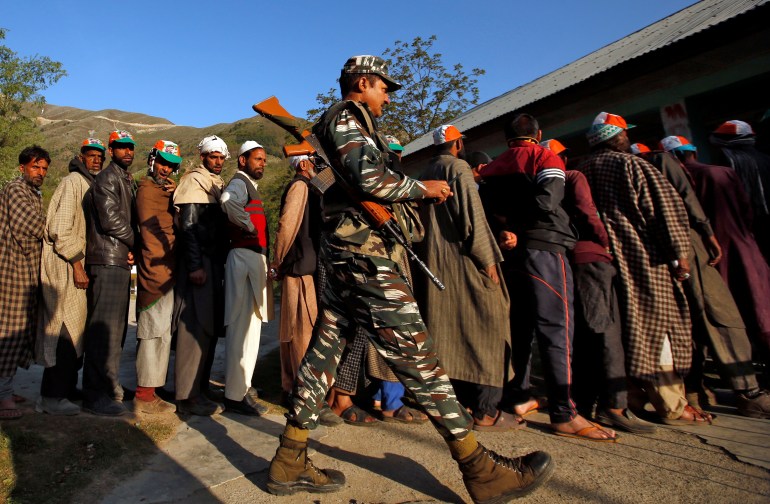Anxiety in Kashmir as India panel proposes to redraw election map
Controversial proposal to raise assembly seats in Jammu causes anger among Muslims, who form the majority in the disputed region.

Srinagar, Indian-administered Kashmir – A controversial proposal to redraw the electoral map of Indian-administered Kashmir has caused anxiety and anger among the region’s Muslims, who say the move is aimed at “disempowering” them.
In March last year, a delimitation commission headed by a former judge of India’s Supreme Court was appointed by Prime Minister Narendra Modi’s government and tasked with redrawing the boundaries of the constituencies sending representatives to the state assembly.
Keep reading
list of 4 itemsTough road ahead for Kashmir separatist movement after Geelani
‘Skin them alive’: Kashmir BJP politician booked for hate speech
What is India’s new endgame in Kashmir?
On December 20, the panel told its five associate members – three from the regional National Conference and two from Modi’s Bharatiya Janata Party (BJP) – that it proposes to increase six assembly seats in the Jammu region and only one seat in the Kashmir valley.
The state assembly in Indian-administered Kashmir was dissolved in August 2018, a year before New Delhi scrapped a law that granted limited autonomy to the disputed region and split it into two federally-governed territories – Jammu-Kashmir and Ladakh.
What is delimitation?
Delimitation refers to the redrawing of boundaries of an assembly or parliamentary constituency to correspond to the changes in the population of a region.
In the political structure of the erstwhile assembly, the valley had 46 seats and Jammu 37. If the panel’s proposals are accepted by the government, the valley will have 47 assembly seats while Jammu’s tally will go up to 43.
In India, assembly constituencies carved out on the basis of population form the basic unit of electoral representation to form the state government.
According to the 2011 census, Indian-administered Kashmir has a population of 12.5 million people, of which Muslims form a majority with 68.31 percent while Hindus are 28.43 percent. The majority of the Hindu population is concentrated in the Jammu region.

While Indian laws make population the basis of redrawing political boundaries – a criterion that is universally accepted – the delimitation commission has made “geographical area and accessibility” a significant basis for electoral maps in the Himalayan region.
According to calculations based on the panel’s proposals in its December 20 statement, a single assembly seat in Kashmir valley will have an average population of 146,000. However, a constituency in Jammu could be carved out from an area with an average 125,000 residents.
Experts say the proposed redistribution of assembly seats is “highly skewed” in favour of Jammu and could turn Muslims into a political minority in India’s only Muslim-majority region.
In the last assembly elections in Indian-administered Kashmir, held in 2014, the Hindu nationalist BJP won 25 of the 37 seats in the Jammu region and none in the valley.
For the last 70 years, all chief ministers in Indian-administered Kashmir have been Muslims.
Yet, having a Hindu chief minister has been the right-wing BJP’s longstanding promise to its supporters in the Muslim-majority region.
‘Divided and disempowered’
The commission’s proposals have sparked anger and anxiety among Muslim politicians and activists in Indian-administered Kashmir, who fear the “disempowerment and disenfranchisement” of a majority community.
They say the proposals are “laced with ideological overtones” of the BJP, which has fast-tracked the delimitation exercise in the region, despite a freeze in the rest of India till 2026.
After India scrapped the special status of Indian-administered Kashmir in 2019, it introduced the Jammu and Kashmir Reorganisation Act in order to redraw the electoral constituencies from the existing 83 seats to 90. The delimitation commission was formed as part of this law.
In their replies to the panel, the three National Conference parliamentarians rejected its proposals while those from the BJP welcomed them.
“The universal precedence of delimitation exercise is population,” Hasnain Masoodi, a parliamentarian from southern parts of Indian-administered Kashmir and an associate member of the commission, told Al Jazeera.
“It means you are the representative of a certain number of people. If the proper criteria is followed, the conclusions will be different and Kashmir will have more seats. But here, be it land laws or employment, all these steps are aimed to disempower and disenfranchise Kashmiris.”
In the Muslim-majority areas of Jammu, locals fear the move is aimed to make them numerically irrelevant by dividing Muslim-dominated constituencies in order to put the Hindus in a position of power.
“This is not going to benefit Muslims in Jammu. This will leave us leaderless and permanently subjugated,” Syed Asim Hashmi, a lawyer and politician from Jammu region’s Doda district, told Al Jazeera.
‘Being deprived politically’
On January 1, the People’s Alliance of Gupkar Declaration (PAGD), an umbrella group of prominent pro-India political parties formed in 2019, had planned a protest against the recommendations of the panel in the main city of Srinagar.
But most of its leaders, including three former chief ministers of Indian-administered Kashmir, were put under house arrest by the authorities on the day of the protest.
Mehbooba Mufti, who was the region’s last chief minister heading a government in coalition with the BJP, told Al Jazeera “they only want to undermine the majority community” here.
“Majority community of Muslims will be divided and disempowered in totality. It is a part of the same agenda. They have disempowered us by attacking our identity, our lands, our jobs. Now, we are being deprived politically,” she said.
Ashok Koul, BJP general secretary in the region, dismissed the fears and said the delimitation exercise is “not based on any religious lines”.
“The commission has proposed seats in a scientific way. Population is not the sole criteria but there are other factors like accessibility,” Kaul told Al Jazeera.
“Jammu is happy because this is justice with them on the basis of accessibility and communication,” he said, adding that the proposals are only a draft right now. “Let’s see what happens.”
But Kashmiri experts say it would be “almost impossible” for the federal government to hold back on the proposals of the commission.
Political analyst Sheikh Showkat Hussain said the proposals “fit within the trend that somehow Muslims are to be disempowered in India”.
“The criteria everywhere is population. That is why Uttar Pradesh (BJP-ruled northern state) has the highest number of seats. But in Kashmir, they go in a different way,” Hussain said.
“It is therefore automatic and natural that there is anxiety and fear because it is the only place where Muslims could be in power, albeit de facto because the centre always remains with a heavy hand,” he said, referring to India’s large military presence in the region.
The Himalayan territory of Kashmir is at the centre of a decades-old enmity between India and Pakistan, who claim the region in its entirety but rule over parts of it.
Tensions between the two nuclear powers have escalated since 2019 when the region was stripped of its limited autonomy and split into two federally-ruled territories.